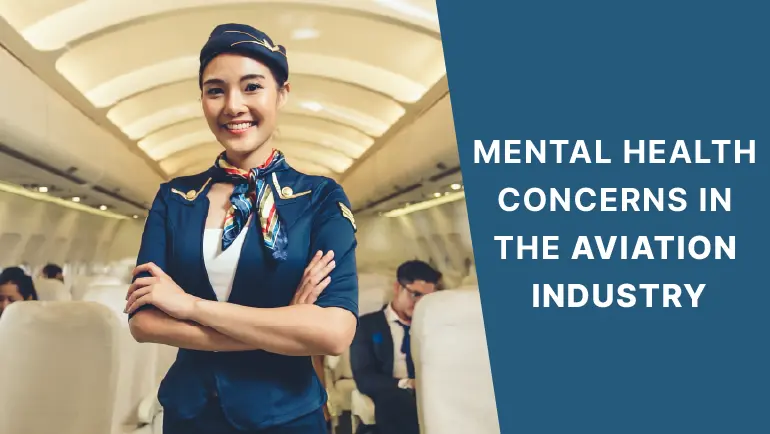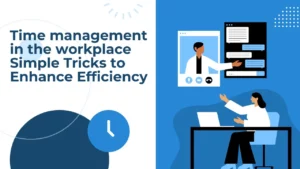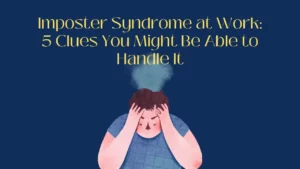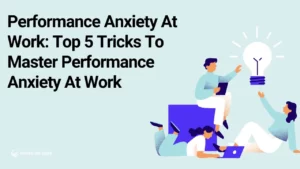Introduction
Don’t you just love aeroplanes, fighter planes, and helicopters? As a child, I used to be fascinated by all of them. I would wonder how an object that heavy could fly so high up in the sky. Every time I would hear the roaring sound of a plane or a helicopter, I would rush outside and wave at it.
As fun as the jobs of the aviation (AVN) industry employees look, did you know that they face a lot of mental, emotional, and physical concerns?
The AVN industry is known for its commitment to safety and efficiency. Due to the growing competition and the pressure to perform in the best possible way, the employees face multiple mental health challenges. For this reason, they must learn to put their mental well-being first. Doing so will also make sure that the industry is safer and more efficient.
“I’ve never known an industry that can get into people’s blood the way aviation does.” -Robert Six [1]
What Does The Aviation Industry Include?
When we think of the aviation industry, we only think of pilots and flight attendants. But, there are more types of job profiles in the industry. Each staff member plays a crucial role in ensuring air travel safety, efficiency, and smooth functioning [2]:
- Pilots: When you enter the airport, you see people dressed in smart white shirts, blue trousers, and coats with a cap, right? Those are the commercial airline pilots. The air force pilots wear the army uniforms. A pilot is a person who flies and lands an aircraft. To become a pilot, you will have to go through strict training and get a license.
- Flight Attendants: Have you seen the people who greet you when you step foot on a plane? They are the flight attendants. As a flight attendant, your work would be to help pilots and co-pilots and follow the instructions given by them. These instructions will also be to make sure that passengers feel safe and comfortable. Before working as a flight assistant, you will get trained to handle all emergencies as well.
- Air Traffic Controllers: If you have ever wondered how an aircraft moves around the runway, it is thanks to air traffic controllers. As an Air Traffic Controller, your work is to guide pilots during takeoffs, landings, and aircraft routing. You will have to be extremely alert at all times. Mainly, you would have to work in control towers and air traffic control centers.
- Ground Crew: When the plane is on the ground, the employees who take care of it and get it ready before take-off and after landing is Ground Crew. You can be a technician, engineer, mechanic, and support staff. You will have to handle aircraft maintenance, baggage handling, fueling, and other ground operations.
- Airport Staff: From the guards at the gates to the employees at the boarding gates, they all come under airport staff. They are people in airport management, security, check-in, baggage handling, immigration, and passenger services.
- Aviation Administrators: Almost every country has its aviation ministry. Professionals working in these ministries and regulatory bodies are called aviation administrators. Their role is to oversee safety standards, regulations, and industry policies.
Read more about- Exploring the Dark Side of Hollywood
What Causes Mental Health Concerns in the Aviation Industry?
AVN employees are responsible for the safety of passengers, baggage, and other goods. Therefore, airlines, aviation administrators, and passengers are always concerned about the mental health of the AVN staff [3]:

- High-Pressure Work Environment: Human life is extremely important. As an AVN employee, you are responsible for the safety of passengers. You might have to manage flight operations and make critical decisions. This responsibility can cause feelings of high-pressure, chronic stress, and anxiety.
- Irregular Work Schedules: The AVN industry is quite unpredictable. You might have to work long hours in different shifts and travel to various countries with separate time zones. These erratic work schedules can lead to sleep disturbances, fatigue, and interpersonal issues.
- Traumatic Incidents: To err is human. However, for AVN members making a small mistake also can cause accidents and harm human life. Such incidents can cause emotional distress, frequent flashbacks of the event, anxiety, and post-traumatic stress disorder (PTSD).
- Isolation and Loneliness: AVN professionals might have to travel frequently and stay away from their loved ones for long periods. Not having family and friends around them can lead to feelings of isolation and loneliness.
- Job Insecurity and Performance Pressure: The industry is volatile. Airlines incur huge losses and even go bankrupt. For professionals, it may cause financial instability, lack of job security, and expectations of high performance, leading to increased stress, anxiety, and burnout.
- Lack of Mental Health Awareness and Support: The AVN industry has stigmatized mental health since its inception. Due to this, many AVN professionals do not report their mental health concerns. The administration must provide access to mental health resources, provide adequate training, and sufficient support systems.
Read more- Actor and Mental Health: 5 Secret Tips To Cope with Challenges
How to Identify Mental Health Concerns in the Aviation Industry?
Mental health issues do not surface in a day. There are always warning signs that we and our loved ones ignore [4]:
- Increased Stress Levels: AVN is a hectic industry. If any of your colleagues notice you showing irritability, restlessness, and difficulty concentrating, it could be because of increased stress levels.
- Fatigue and Sleep Disturbances: The AVN workforce can look exhausted and sleep-deprived due to erratic work roster and time zone shifts. These changes may affect your ability to perform optimally to the best of your cognitive abilities.
- Emotional Distress: As an AVN professional, you may feel vulnerable and experience mood swings, sadness or hopelessness, or anxiety. Emotional distress can hamper your decision-making abilities and close relationships.
- Decreased Job Performance: As an AVN person, if your mental health is not ok, you may notice that your productivity is going low, you find it difficult to make decisions, and you are unable to pay attention to detail. You may end up compromising safety and efficiency.
- Social Withdrawal and Isolation: AVN jobs are demanding because you have to work for long hours. Long hours of work can lead to feeling isolated and lonely. You may feel that you need to step away from social conversations and connections because you’re so tired. However, this social withdrawal can lead you to feel more lonely.
- Physical Symptoms: One of the most common ways to know that you are dealing with mental health concerns is when you start getting sick often. It could be a headache or some kind of gastric issue. But, if, as an AVN person, you are facing that, then please pause and start taking care of your mental well-being.
How Do You Have A Work-Life Balance And Care For Your Mental Health As An Aviation Industry Personnel?
Ideally, professional and personal lives need to be separated, and there must not be any blurred lines. Maintaining a work-life balance and caring for mental health as an AVN industry employee is vital [5]:

- Establish Clear Boundaries: It is very important to set clear boundaries between work and personal life. You must learn to define a particular time in the day for rest, relaxation, and personal activities.
- Prioritize Self-Care: Self-care should be a part of your everyday life. Incorporate activities like working out, eating healthy, drinking enough water, and getting adequate sleep. If you take care of your physical health, your mental health will automatically take care of itself. Moreover, allow yourself to take leave on days that are difficult for you.
- Utilize Support Networks: Create a support system of like-minded individuals. You can pursue your hobbies or engage in social activities along with the people you love.
- Practice Stress-Management Techniques: Stress is manageable. You can utilize techniques like deep breathing exercises, mindfulness, and meditation. These techniques effectively reduce stress and improve overall well-being.
- Take Advantage of Available Resources: The AVN administration globally has a separate wing for mental health. They offer services like counselling, employee assistance programs, and life coaching. Utilize these services for the betterment of your mental health.
- Communicate Openly: Communication is the key to finding solutions. You must freely discuss workload and personal needs with your seniors and co-workers. This discussion can help ease the workload from your shoulders and get equally divided amongst all co-workers.
Conclusion
The pressures of the aviation (AVN) industry can harm the mental health of its professionals. Along with triggers of stress and challenges, managing mental health should be the number one priority for AVN employees. This will ensure that their well-being is at an acceptable level for the industry’s overall safety. The AVN administration must take steps to provide mental health services and promote work-life balance. By doing so, the AVN industry can create a healthier workforce, ensuring safer skies for all.
If you work in the aviation industry and are seeking help, connect with our expert counsellors or explore more content at United We Care! At United We Care, a team of wellness and mental health experts will guide you through the best methods for your well-being.
References
[1] “Robert Six Quote,” A-Z Quotes. https://www.azquotes.com/quote/612202
[2] Revfine.com, “Aviation Industry: All You Need to Know About the Aviation Sector,” Revfine.com, Jan. 12, 2022. https://www.revfine.com/aviation-industry/
[3] D. Gradwell, “Aviation Mental Health,” Occupational Medicine, vol. 63, no. 1, pp. 81–82, Jan. 2013, doi: 10.1093/occmed/kqs196.
[4] R. Bor and T. Hubbard, Aviation Mental Health: Psychological Implications for Air Transportation. Gower Publishing Company, Limited, 2007.
[5] “Mental health in the workplace,” Mental Health and Substance Use, Sep. 28, 2022. https://www.who.int/teams/mental-health-and-substance-use/promotion-prevention/mental-health-in-the-workplace










